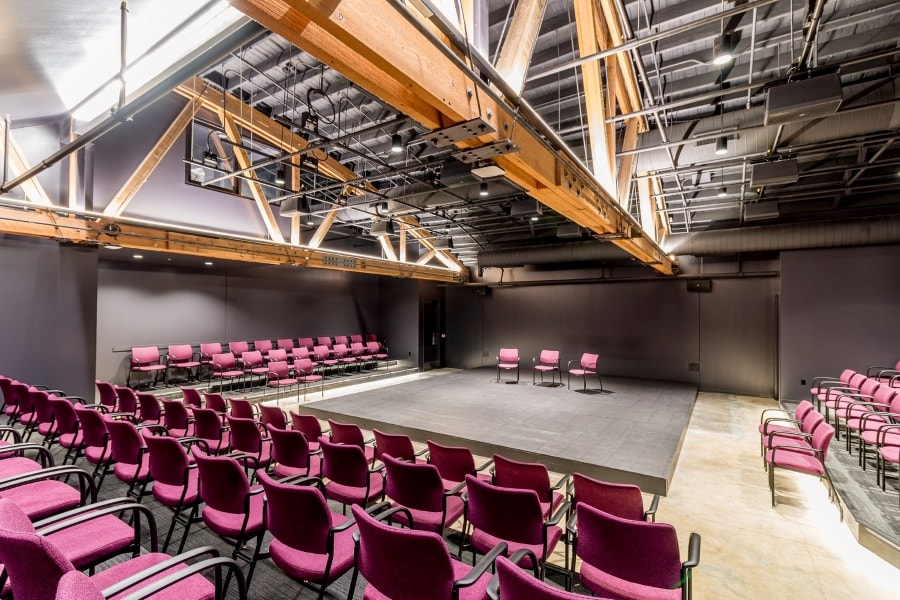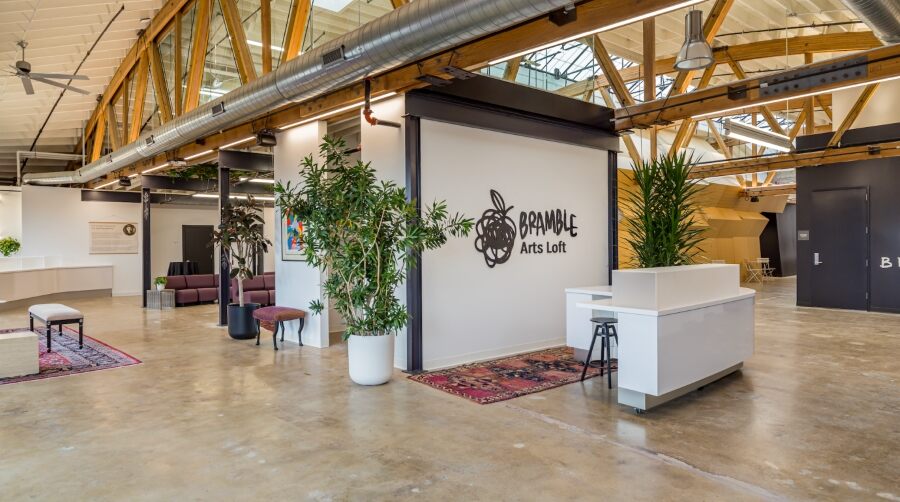Nestled in the culturally diverse and queer-friendly Andersonville neighborhood, Chicago’s brand-new Bramble Arts Loft is a flexible, creative playground for local theatremakers. Neighbor to the Understudy, the building features historic scaffolding mixed with modern design by Avram Lothan, sun-flirting windowed ceilings in the spacious lobby, and an intangible but unmistakably welcoming air. Amid a troubling number of company closures, both locally and across the U.S., Bramble Theatre Company, founded in 2021, has managed to acquire a permanent home with an expansive layout to match its community-centered mission.
“During the pandemic, we lost so many artistic venues, which was absolutely heartbreaking,” said Bramble co-founder and artistic director Karissa Murrell Myers. “We felt this was a chance for us to not only have an artistic home for our growing company, but also to provide space for our colleagues and fellow artists to rehearse, perform, and create their work. So we took a chance and jumped at it.”
To fill that gap, the multi-use loft offers many opportunities to connect over art. After a two-year construction process, the space’s attention to detail stands out. There are thoughtfully built accessible dressing rooms, showers, and kitchen alongside locally sourced art pieces, secondhand furniture, and three different stages. A favorite touch: The Berry, their modular black box, has rubberized floors to prevent actor injuries. A favorite among patrons at one of Bramble’s opening events was George’s Bar, named after a late beloved theatregoer.
“It’s to honor those that came before us,” said co-founder and creative producer Matthew Lunt.

While community members have begun to enjoy the loft, mingling with drinks in hand and sunshine on faces, the Bramble leaders are staying focused on how their new space and theatre company will serve their communities. Bramble Arts Loft will operate separately from the Bramble Theatre Company itself. The flexible event space aims for a self-sustaining model, with money made from rentals to support the theatre company’s work. This means that, while it was a lift to construct the new space, the Bramble folks aren’t worried about how their own theatre company will stay afloat financially.
“We’re on track for our five-year plan,” said Lunt. “Because the Arts Loft is a for-profit institution with a flexible mission, we’re open to weddings and events. What’s nice about that is that leaves the rest of the calendar open for a longer production and education programing.”
When it came to budgeting, the Arts Loft was made possible by a gift from the Lunt family, in addition to local community fundraising. Construction and start-up costs totaled approximately $2.8 million, they reported. “We’ve been so lucky to have a lot of supporters,” said Murrell Myers. With this stream of funding, the theatre company has been able to prioritize equitably compensating people. Murrell Myers even instituted an initiative in which the theatre company pays people to attend callbacks, critically reconsidering artists’ financial burdens and a cultural organization’s role in honoring creatives’ time.

Speaking with the co-founders, it became clear how important it was to them that Bramble Theatre Company’s values of education, innovation, fearless mess, and intentional presence were ingrained in everything they do. The collective of producing artists first met at the School at Steppenwolf, and among them formed such a space of possibility that they decided to keep experimenting together. Moving into this new home, they said, has brought back the feeling of magic they first felt.
“We’ve been really craving having the ensemble together, sitting around in a circle, working on something together,” said Murrell Myers. “I’m so excited for all that’s to come here.”
Looking around the space, Lunt smiled. “My hope is that, yes, we really do feel like an open door to everybody,” Lunt said. “We’re not the shiny space downtown, we’re the funky arts venue that hosts 150 people intimately, flawlessly.”

Indeed, they’re ready and excited to figure out what that looks like, both for folks who rent their spaces and for Bramble’s own company. Their operating budget is evolving but currently sits at just under $120,000, said Lunt. Coming up June 26-30, Bramble’s Festival of Unfinished Work, now in its third year, will further highlight the company’s focus on community and innovation. After collecting submissions of original unproduced works from Chicago playwrights, Bramble’s ensemble and staff selected finalists for 10- to 15-minute scenes to be brought to life by Chicago directors and actors. At the festival, attendees are given a handful of dried beans, which they can then use to vote for their favorite pieces by dropping beans into cups labeled with each show’s title. The top two winners will receive a workshop and public staged reading.
“It’s been really exciting to see people come back and react to the reading in the fall, to learn what got selected, to learn how each piece ends,” shared Murrell Myers. “It’s rare for an audience to get that kind of voice.”
Since American Theatre’s Chicago office opened about a year ago, we’ve witnessed many closings. But Bramble’s Arts Loft joins a hopeful countertrend, along with American Blues Theater’s permanent home, Black Ensemble Theater’s plans for “Free to Be” village, and Definition Theatre’s development of a new South Side home—all of them spaces focused on serving Chicago’s loyal art-loving and theatremaking communities.
“I don’t think we can forget that the audience exists with us as part of the theatremaking space,” said Murrell Myers. “If we were just doing it by ourselves with no audience, what would it be for? For whom? I don’t want us to lose sight of how community must be a part of the art-making process.”
Gabriela Furtado Coutinho (she/her) is the Chicago associate editor of American Theatre.





